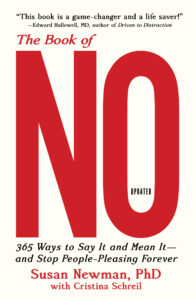Dr. Susan Newman’s New Book Explains Why You Should Say No to Your Children…and How to Do It. A must read for the pushover tendency in all of us.

You do your children a major disservice by regularly giving in to their wants, wishes, and demands. Yet, so many parents are uncomfortable saying no to their children. Not easy being the “tough guy.” It’s natural to feel guilty when you think you’re depriving your child of something he has his heart set on. But, should you?
The inability to refuse a child has triggered a widespread shift, from parents being in charge to children orchestrating much of family life. Without refusals, eventually children can come to feel entitled, believing that everything is coming their way without having to work for what they want.
When you give in all the time, other crucial life lessons are lost. Your refusals help children cope with disappointment, become resilient, hone their decision-making abilities, and recognize and respect boundaries—skills they will need when they leave the nest. Using “no” more often can also help your child develop empathy and understand that there are others with wants and needs of their own. No is a beneficial learning experience—you may not see results immediately, but chances are you will.
4 Essentials for Getting Comfortable with “NO”
Incorporating no can be challenging. Here are four suggestions that will help you put the word to work for you and ultimately benefit your children.
1. Stand strong but be comforting.
This strategy is especially effective with young children, who often face feelings and situations beyond their emotional grasp. When using no, you may encounter some unattractive, challenging behavior—tantrums, aggression, whining or back talk, for example. Stand your ground because embracing no early sets the stage for a more peaceful coexistence as your child matures and during the teen years.
Pay attention to how you say no; your approach directly correlates to how effective your denial will be. Try lowering your voice. Keep explanations clear and brief; skip the lectures. When a child attempts to sway you through obstreperous, tyrannical behavior, stand your ground. When you don’t, your child learns he can bully you into agreeing.
2. Avoid the temptation to give in.
Moody, even angry, behavior can wear down a stressed, overwhelmed parent. As children age and enter elementary school, they often make outrageous demands and time-consuming requests: “I’m not going to school today.” “Can I stay up to watch…?” “I can’t do my science project. Will you?” Older children are particularly skilled at crushing parents’ resolve. They’re mature enough to offer earnest, plausible cases for their wants.
Don’t give in when you know your decision is in your child’s best interest. The fact that doing chores as a child leads to success in adulthood is well documented. That should be reason enough to insist when your child tries to “weasel” out of his and begs or attempts to manipulate you into doing them—“just this one time,” is often the plea.
3. Parenting is not a popularity contest.
It’s not your job to be “the good guy” or to be seen as a winner or hero in your children’s eyes. Your job is to provide solid guidance, to be their leader and teacher, not their pal. The word no is a vital tool for keeping children on track toward becoming responsible, respectful citizens.
Keeping no at the tip of your tongue is a sound lesson in how the world functions, that you don’t always get what you want. Encourage your children to be faithful to promises—following through after signing up for a team, honoring social commitments or not going over cellphone data charge limits, for instance. Sometimes a negotiation or compromise may be necessary—that too is a learning experience.
4. Abandon any guilt you may feel. Pronto!
You want to be a caring, compassionate parent, but there are circumstances when a parent’s support is counterproductive—particularly when children are older. Frequently it’s more important to bow out of giving advice or solving their conflicts with friends or teachers when children old enough to do so themselves. Ask yourself: Would a “yes” be enabling—not really helping your child square away his own problems? Or, learn how to argue or defend himself or negotiate?
Enforce the rules you make and the boundaries you set. If you want your children to become independent and successful, your no’s go a long way in giving them essential tools they need for the time when they are no longer dependent on you.
Susan Newman is a social psychologist and author of 15 relationship and parenting books, including Under One Roof Again, Parenting an Only Child, and Little Things Long Remembered. She is a member of the American Psychological Association and a regular contributor to Psychology Today and US News and World Report. Visit Dr. Newman’s website to determine how much of a yes-parent you are.
 This article was adapted from Dr. Newman’s latest book, The Book of No: 365 Ways to Say it and Mean It—And Stop People-Pleasing Forever. It details how to break free of the “yes-habit” with children (from toddlers to teens to adult children), friends, family, and at work without damaging the bonds with your children or your relationships with others in your life. The book is filled with research and timely scenarios that offer more ways to say “no” without feeling guilty. You’ll discover how to:
This article was adapted from Dr. Newman’s latest book, The Book of No: 365 Ways to Say it and Mean It—And Stop People-Pleasing Forever. It details how to break free of the “yes-habit” with children (from toddlers to teens to adult children), friends, family, and at work without damaging the bonds with your children or your relationships with others in your life. The book is filled with research and timely scenarios that offer more ways to say “no” without feeling guilty. You’ll discover how to:
- Recognize when someone is manipulating you into “yes”
- Be ready with the words you need to refuse
- Avoid being overcommitted, overworked and overwhelmed
- Put an end to feelings of resentment or frustration
- Have enough time for things you want to do
- Establish and keep your boundaries strong
And I highly recommend it!

